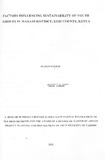| dc.description.abstract | The population age bracket of 30 years and below constitutes about 75% (about twenty five million people) of the Kenyan population. This segment of the Kenyan population is the worst affected by poverty and unemployment (R.O.K., Ministry of Youth Affairs, 2006). Efforts have been put in place by the government, other organisations and individuals to address the challenges that face this group of Kenyans. One approach that has been widely used world over is that of organising these youths into youth groups which can engage in economic activities for their own welfare. However Youth problems have been worsening in spite of the increased number of youth groups dealing with matters that affect the youth. A report on a survey conducted on the status of youth groups in Marani District revealed that youth groups are faced by many challenges that have hindered them from achieving their objectives. Of the 102 youth groups that had been registered, 28 were no longer existing, 16 were dormant and only 58 were active (R.O.K., Ministry of Youth Affairs, 2011) .
This study sought to establish factors influencing Sustainability of Youth Groups in Marani District, Kisii County, Kenya. The research was guided by the following objectives: to establish the extent to which management of youth group funds influences sustainability of Youth Groups in Marani District; to assess the extent to which leadership of youth groups influences sustainability of Youth Groups in Marani District; to establish the extent to which participation of youth group members influences sustainability of Youth Groups in Marani District, and to determine the extent to which implementation of project activities influences sustainability of youth groups in Marani District. Survey research design was used to collect the data from a target population of 814 respondents. 63 chairpersons of the youth groups, 63 secretaries of the youth groups, 63 treasurers of the youth groups and 233 non-office bearers were selected to make a sample size of 422. Validity and reliability of the instruments was ensured by test-retest techniques. Permission to collect data was given by the Ministry of Higher Education Science and Technology. The collected data was analysed by use of percentages and frequencies.
The findings of this study indicated that sustainability of youth groups depends a lot on the type of leadership the youth group has. The findings of this study indicated that leadership remains a big challenge for sustainability of the youth groups. The findings show that the youth groups lack financial statements like budgets and cash books. The findings of this study show that management of youth group funds is not transparent. This therefore means that financial management of youth group funds influences sustainability of the youth groups. The findings show that participation by members in youth group meetings to select, plan and implement project activities is minimal. This means that participation of youth group members in project activities is a factor that has influenced sustainability of these groups. The findings show that project activities are never implemented on time and according to plan, group members do not play their roles and projects are never completed on time. The findings in this study therefore show that implementation of projects has influenced sustainability of the youth groups. The study recommends that the government takes a close look at the leadership of youth groups and assist in developing the leadership by training them through various leadership courses that can improve their leadership abilities. Possibilities of linking these youth groups with other groups in developed nations should be explored so that such linkage can expose the local youth groups to international opportunities and experience which can playa great role in their improvement of the way they
carry out their projects. | en_US |

